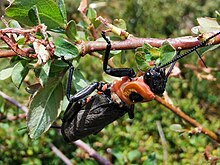Thaumatoperla alpina
| Thaumatoperla alpina | |
|---|---|

| |
| Habitus photograph of Thaumatoperla alpina, Falls Creek, Victoria. | |
| Scientific classification | |
| Domain: | Eukaryota |
| Kingdom: | Animalia |
| Phylum: | Arthropoda |
| Class: | Insecta |
| Order: | Plecoptera |
| Family: | Eustheniidae |
| Genus: | Thaumatoperla |
| Species: | T. alpina
|
| Binomial name | |
| Thaumatoperla alpina Burns & Neboiss, 1957
| |
Thaumatoperla alpina is a species of stonefly in the genus Thaumatoperla,[1] and are the largest Australian stonefly.[2] They are endemic to the Bogong High Plains area of the Victorian alps, Australia.[3]
Description
[edit]Large insect, females 36–44 mm (excluding antennae and cerci), males generally smaller.
As adult: Two pairs of wide, black membranous wings, the posterior wings having a dark-blue iridescence.[1] Head and legs black. The prothorax is large, oval-shaped and orange and with a distinct black marking in the centre of the pronotum. The cylindrical abdomen is slightly flattened dorsally and pale yellowish-grey with black markings.[1] Two large black cerci and two long black antennae.
They are incapable of flight.[2]
Distribution
[edit]Thaumatoperla alpina are endemic to the Bogong High Plains of the Victorian alpine area in south-eastern Australia.[3] Genetic analyses indicate that there are three sub-populations separated by the three main catchments: West Kiewa, East Kiewa and Mitta Mitta.[3]
Habitat
[edit]T. alpina inhabit alpine riparian heathland. Nymphs live in the hyporheic zone of mountain streams.[3] Where introduced rainbow trout (Oncorhynchus mykiss) are absent, T. alpina nymphs are the top-level stream predators.[4]
Life history
[edit]T. alpina spend approximately three years as nymphs.[2] They emerge as adults in January - April.[3]
Etymology
[edit]From Latin Alpinus, referring to their alpine habitat.
Conservation Status
[edit]Listed as Threatened under the EPBC Act 1999 and Flora and Fauna Guarantee Act 1988. Classified as Endangered by the International Union for Conservation of Nature (IUCN).
References
[edit]- ^ a b c Burns, A.N., & Neboiss, A. 1957, ‘Two new species of Plecoptera from Victoria’, Memoirs of the National Museum of Victoria, vol. 212, pp. 91-242.
- ^ a b c McKay, S., Bryce, C. & Papas, P. 2005, Impacts of fire on the distribution of a predatory stonefly (Eustheniidae: Thaumatoperla alpina) in the Bogong alpine region. Freshwater Ecology, Arthur Rylah Institute for Environmental Research, Technical Report Series (155), Department of Sustainability and Environment, Melbourne; La Trobe University, Wodonga, Victoria.
- ^ a b c d e Mynott, J.H. 2016, Surveying the threatened species Thaumatoperla alpina across the Bogong High Plains. Final Report prepared for the Department of Land, Water and Planning by The Murray–Darling Freshwater Research Centre (117/2016), retrieved from <https://opal.latrobe.edu.au/articles/book/Surveying_the_threatened_species_Thaumatoperla_alpina_across_the_Bogong_High_Plains/8188715/files/15260393.pdf>.
- ^ Bryce, C.L. 2001, Predatory stoneflies (Plecoptera: Eustheniidae) of the Bogong High Plains, Victoria: systematics, distribution, ecology and conservation. Honours Thesis. November 2001. La Trobe University, Wodonga, Victoria.

